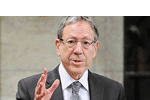
Source: CHICAGO SUN TIMES
By: Irwin cotler
It has been almost a year since the start of negotiations between the P5 + 1 countries (USA, UK, France, Russia, China and Germany) and Iran over the latter’s nuclear program. However, it appears unlikely that an agreement will be reached by the November 24 deadline. Indeed, the best that can be expected by then, according to at least one Western official, is “the outline of a final deal, but probably not the deal itself.”
Source: CHICAGO SUN TIMES
By: Irwin cotler
It has been almost a year since the start of negotiations between the P5 + 1 countries (USA, UK, France, Russia, China and Germany) and Iran over the latter’s nuclear program. However, it appears unlikely that an agreement will be reached by the November 24 deadline. Indeed, the best that can be expected by then, according to at least one Western official, is “the outline of a final deal, but probably not the deal itself.”
There are multiple reasons for this outcome. For one, it is uncertain that Iranian Supreme Leader Ayatollah Ali Khamenei has given Iranian negotiators the mandate to make necessary compromises. Iranian officials have made it clear that they want to massively increase the number of centrifuges for uranium enrichment, while the P5 + 1 states want to reduce the 19,000 currently installed to the low thousands.
Perhaps one of the most significant factors involved in the apparent failure of the talks is the Iranian push for “a rapid lifting of all sanctions,” which clashes with the American and European position that these be gradually lifted if Iran demonstrates compliance with international agreements. This stands in contrast with the position of the Republican majority in the United States Congress, which is willing to impose even more sanctions, which nuclear experts believe could potentially drive Iran from the negotiating table entirely. The Obama administration, on the other hand, believes that the lifting of sanctions is necessary to convince Iran to end its nuclear ambitions.
Any approach to sanctions, however, must be implemented with a view to achieving Iranian concessions that will have a measurable effect on the regime’s nuclear ambitions, rather than simply creating another “calm environment” for increased nuclear activity. As such, the P5 + 1 must set out the following specific and verifiable conditions:
1. Iran must fully implement its obligations under Security Council resolutions and the Nuclear Non-Proliferation Treaty. Part of Iran’s responsibility as a signatory of the Non-Proliferation Treaty is to grant IAEA inspectors immediate and unfettered access to all suspected nuclear sites, which it has failed to uphold by misleading the agency regarding the extent of its nuclear activities. Any future talks require Western negotiators to identify robust IAEA inspections, including unannounced assessments and unfettered remote monitoring of suspected nuclear facilities, as a necessary condition.
2. Iran must suspend its enrichment of uranium so that it cannot use negotiations to buy time for a nuclear breakthrough. Verifying this suspension requires Iran to transfer its uranium stockpiles to another state’s custody, which would be returned for power generation following proper inspection and monitoring. This also requires Iran to reduce the number and type of centrifuges in its possession, which experts like David Albright believe to be necessary to constrain the weaponization of nuclear materials.
3. Iran must suspend its heavy water production at its Arak facility, which is a key component for producing the plutonium cores of nuclear weapons. Iran claims that Arak only produces medical isotopes for research, but these can be purchased from international markets or produced by the Tehran reactor. The Iranian regime’s failure to comply with a UN Security Council resolution to end construction at Arak and to provide the IAEA with updated information about the reactor’s design since 2006 is unacceptable.
4. Iran must fully inform the international community about its past proliferation activities and its plans to build 10 additional uranium enrichment facilities. It is Iran’s responsibility to satisfy IAEA concerns regarding enrichment activities at the Fordow and Natanz facilities, plutonium production at Arak, and laser enrichment at Lashkar Ab’ad. It must also provide a substantive response to the IAEA’s information request on Iran’s planned uranium facilities. In addition, the National Council of Resistance of Iran (NCRI), which exposed Iran’s facilities at Natanz and Arak, now says that it has information about a centre for nuclear weaponization research in Tehran that the regime is attempting to shield from detection.
Iran’s past tendency of using negotiations to conceal or deflect attention from its nuclear activities, along with the strong desire of the P5+1 to reach an agreement, make a complete collapse of the talks unlikely. For future negotiations to successfully curtail Iranian nuclear ambitions, however, Western states, and the United States in particular, will need to ensure that Iran takes concrete steps to comply with the non-proliferation treaties to which it is a party.
Irwin Cotler is a Member of the Canadian Parliament, Emeritus Professor of Law at McGill University in Montreal, and the former Minister of Justice and Attorney General of Canada. He is co-chair with Senator Mark Kirk of the Inter-Parliamentary Group for Human Rights in Iran and a Member of the Advisory Board of United Against a Nuclear Iran.
l


